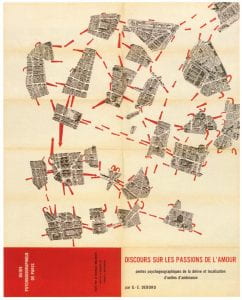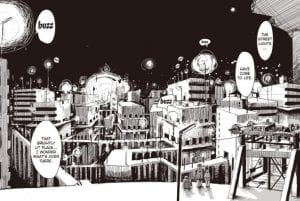Reed graduated from UC Santa Cruz’s Games and Playable Media MS Program in 2021, and currently works as a Release Manager at Bandai Namco Entertainment America. We had a chance to catch up with Reed to learn how their Master’s degree has re-launched their Games career, and also to gain more insight into their transcendent GPM Capstone Project, Dear Future.
For the latest on Dear Future, check out their Twitter page with live feeds of player contributions.
How and when did you know that you wanted a career in gaming?
In 2010, Brown v. EMA was being argued before the U.S. Supreme Court. This case concerned a bill that would have introduced restriction on who could purchase violent games. I wanted to be a writer at the time and wrote open letters and petitions to government officials each year. I decided to base my letter that year around the U.S. Supreme Court case and sent it to State Senator Leland Yee, the bill’s originator. That got me an audience with his office, and while not much convincing happened there, the research that I did got me interested in making games. I took a course in game design that summer and built a few game jam prototypes and RPG Maker projects. A year later, when it came time to apply for colleges, I applied to USC and was accepted. The training and tutelage I received set me up for a career in games.
Can you describe the transition from GPM student to working with AAA titles? What part of the GPM curriculum best prepared you for life in the AAA lane?
Prior to graduate school, much of my work was in indie games. I handled production on games like Manifold Garden and Lucah: Born of a Dream, experimental games where the key measures of success were artistic and cultural impact rather than commercial impact. I love those fringes and feel at home there. However, before GPM, I struggled to comprehend the needs and requirements of the conventional, mainstream game industry.
Things like professionalism and the relationship of different parts of development to capital and audiences eluded me. I think Terry’s class (Terry Smith – GAME221 – Professional Development ) as well as MJ’s stories about his experiences at EA (Michael John – Vice Chair of the GPM program) helped me understand how companies work outside of the punk-fringes that I called home. Understanding the role of a publisher, and how mainstream games are different from experimental ones, allowed me to achieve a new level of professionalism and break out of my comfort zone and do new kinds of work.
Another thing that helped me break into AAA was the opportunity to interact with my diverse cohort, which taught me a lot about different game development scenes and communities. For instance, learning what East Asian gaming scenes, audiences, and development methodologies are like from other students in my cohort prepared me well for working at an East Asian company. Previously, I was only familiar with development methodologies and cultural traffic of U.S. indie games. Learning about International mobile, indie, dojin, and AAA communities by talking with other students in my cohort expanded my understanding of the world significantly. The diverse student body also prepared me to succeed when working with international teams. A literacy in media cultures from outside the U.S. helped me handle IPs rooted in histories that were not my own with respect and care. It also helped me develop a more sophisticated understanding of history, media production, and mass culture, which has allowed me to enjoy games on a deeper level.
The Class of 2021 GPM cohort produced some amazing Capstone Projects. Dear Future is truly remarkable in so many ways – the storyline, graphics, and audio are incredibly creative. Can you tell us how this game concept game about, and how it evolved over the year your team worked on it?
I started developing ideas for Dear Future (available on itch.io and steam) in 2013, when I was working with Jeff Watson on Reality Ends Here at USC, which was a card game centered around swift media production. That game was influenced by anti-hierarchical art movements of the 19th and 20th centuries. Stuff like Fluxus, the Surrealists, the Situationist International, and Psychogeography were all art movements that sought to establish new ways of being outside of the capitalist norm, and I found all that fascinating. In an environment where students felt aggressively pressured to create polished, commercial-facing stuff to appeal to prospective employers, Reality Ends Here‘s anarchic spirit provided a space for students to make trashy, experimental work that followed their interests and passions. Rejecting hierarchical, quantifiable measures of quality, like grades, allowed creativity to bloom.

Psychogeography of Paris
A year later, Twitch Plays Pokemon was run in the winter of 2014. This was a Twitch-based game where players would control an emulated version of Pokemon Red by entering in commands through Twitch’s chat. Effectively, hundreds of thousands of players would collectively work together to beat the game. Each player was weak and had very little power as an individual to influence the outcome of the game. However, as a collective mass of thousands, they could accomplish the game’s goals with the gestalt of their contributions. I thought this mode of play, a massively cooperative style of game that was intrinsically anti-competitive, was inspiring. Where capitalist culture tends to pit people against each other to the benefit of a few, I saw in Twitch Plays Pokemon, a healthier way of life centered around community-building, collective action, and shared joy. In many ways, I saw it as a manifestation of the goals of the New Games Movement, which was a 1970’s anti-nationalist project to reject competitive games in favor of cooperative ones.
Dear Future attempted to synthesize these two disparate interests, anti-hierarchical art-making and anti-competitive play, by presenting a massively cooperative game centered on communal creativity. The mandates that I set forward were twofold: all players must work together towards a shared objective, and engagement with the game’s systems must result in the production of a media artifact.
I produced the Photo Mode update for Manifold Garden earlier that year and took photography classes in college, so I decided to pursue a prototype centered around taking pictures with a camera. There’s a lot you can do with a camera. By personalizing your settings and shooting the same things in different ways, you can achieve results that are extremely personal to you and your style. This suited the needs of the game. To allow the player base to produce an expressive range of photographs, a broad amount of geometry would be needed. Procedural generation, for which there is a great community around at UC Santa Cruz, provided the perfect tool to allow for diverse and expressive photos.
I also worked with the Manifold Garden team on cloud save implementation. I saw the potential for a unique and inexpensive implementation of co-operative multiplayer in the cloud save technology here, which would have allowed us to achieve “collective play” by passing on a save file between players. In Dear Future, player progression data is shared by all players, allowing them to work together across many sessions to achieve shared objectives.
The game’s settings would be extremely important to the success of the game because it needed to be an expressive place where people would want to take pictures. At the time, the coronavirus pandemic was beginning to escalate into a global threat, and I was reading Tsukimizu’s Girls Last Tour, a manga about two girls wandering the remnants of a post-apocalyptic world alone, and struggling to comprehend past turmoil. Seeing some groups actively agitate the pandemic by pushing for their own financial agenda, resulting in heightened death and suffering, bothered me greatly, and so I wanted the setting to express some of the collective anger at the greed and callousness of those groups. Dear Future’s world manifested as a post-apocalyptic city afflicted by a crisis agitated by a ruling classes’ refusal to cede power and imagine other forms of social and political organization. This suited the cooperative mechanics of the game well.

Girls’ Last Tour
When the game was greenlit for production, the team added their incredible ideas and made the game richer, more thematically resonant, and more successful. Allen Zhang designed new ways for narrative and exploration to be experienced across multiple playthroughs. Ruonan Chen implemented a beautifully versatile procedural generation algorithm. Sihao Zhou introduced new, handcrafted areas that advanced our narrative goals, and Ana Love used her architectural background to produce a striking and gorgeous cityscape. We expanded the team later with two writers, a composer, and three additional artists. They breathed new life into the game and allowed it to evolve and grow. Ultimately the gestalt contributions of an incredible team transformed Dear Future into something special and unique.
Do you remember why you chose to pursue a Master’s degree in games, and why you chose UCSC GPM?
I had several reasons to pursue a Master’s degree. The first of which was that I wanted the opportunity to eventually teach game design and production. An advanced degree in the matter is a prerequisite for many adjunct teaching positions. Having the opportunity to explore my own personal interests in games more directly was also significant, since while the niche nature of my work was a hard sell in the conventional industry, the culture of intellectual curiosity found in universities would provide an environment for me to do experimental work, like Dear Future.
I would also be remiss to omit the fact that career progression was a significant contributing factor towards my interest in a Master’s degree. Prior to graduate school, I lived a fairly precarious life in an expensive city. By dramatically improving my skills, I’ve been able to achieve a greater level of stability.
Do you have any advice for people who want a career in video games?
Stick with your friends and do everything you can to help take care of each other. Having a strong network of people who you support and trust will take you far.
